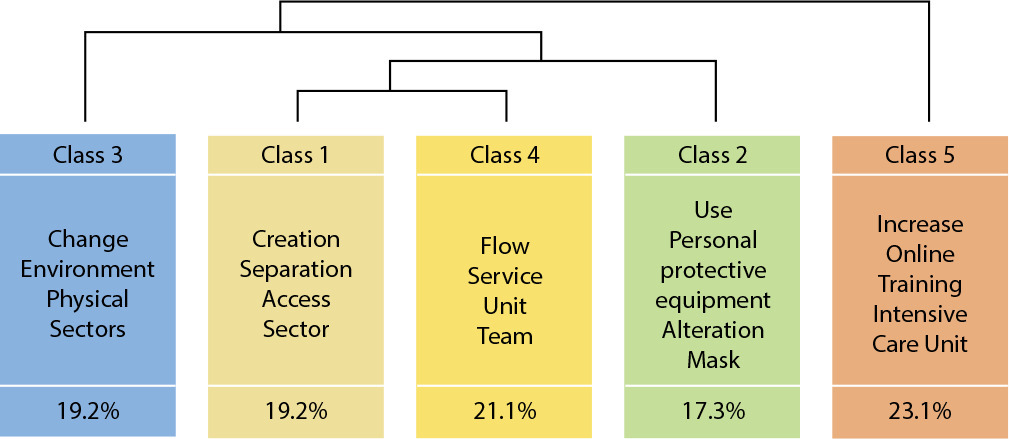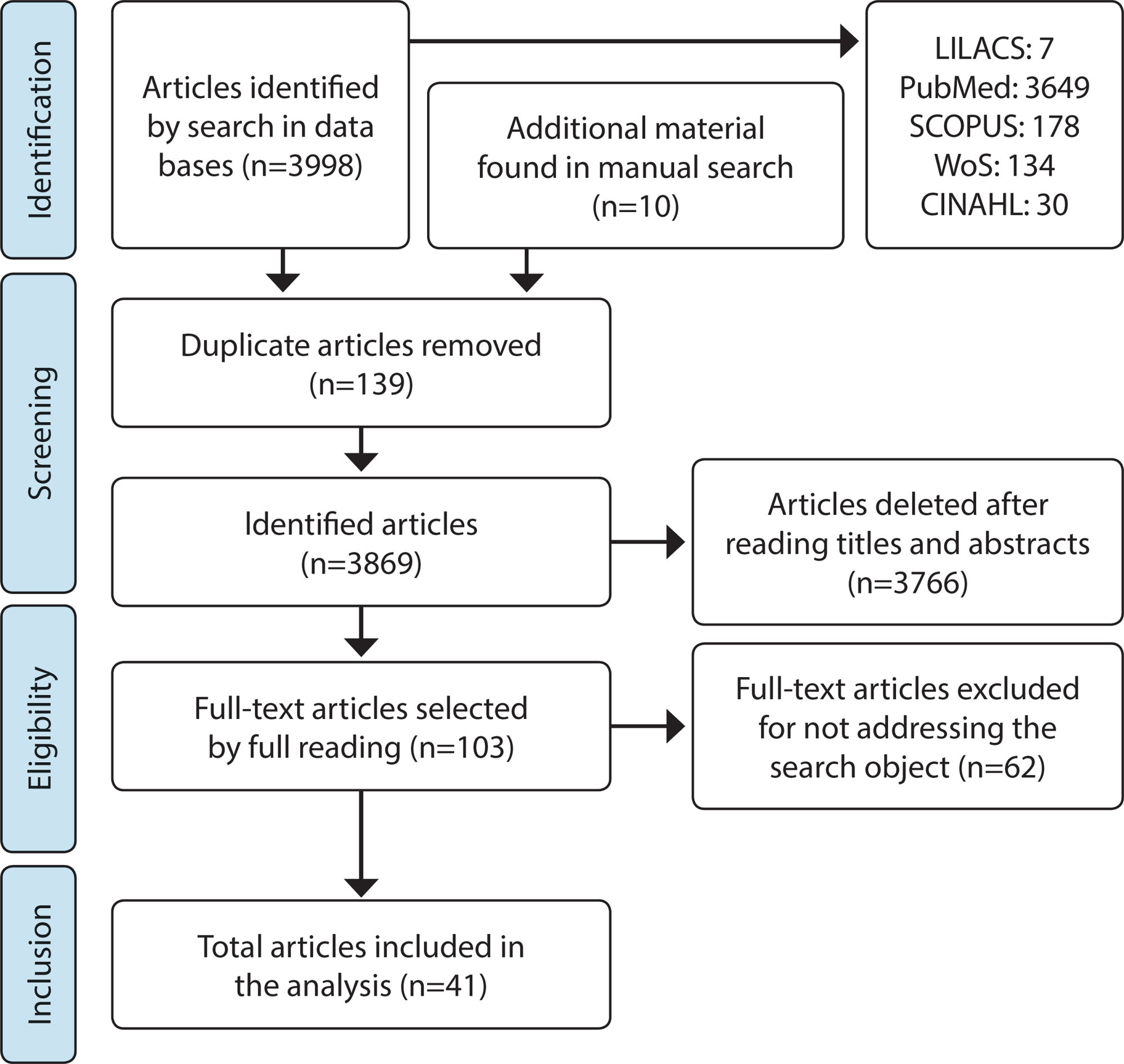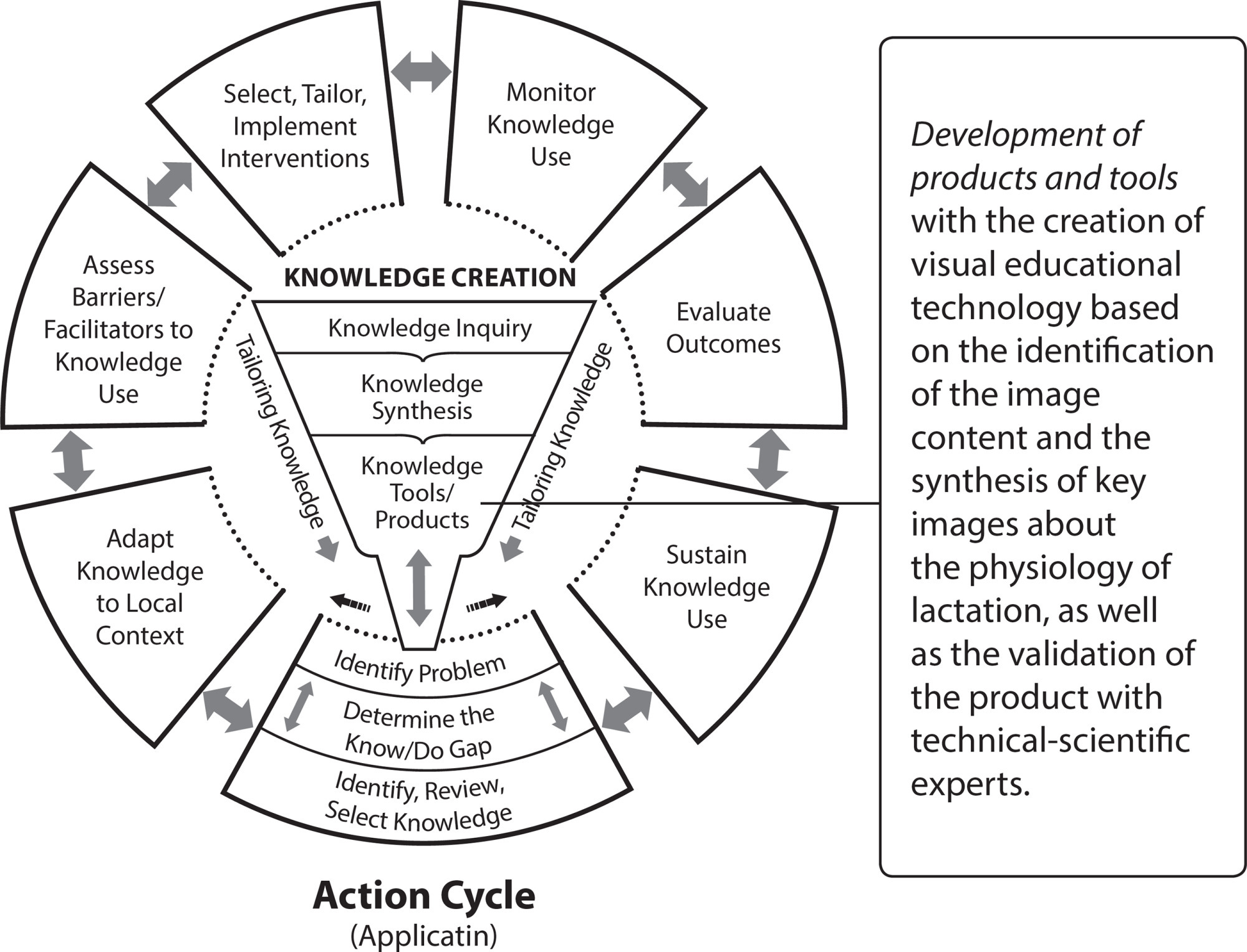-
RESEARCH01-01-2017
Perception of nursing professionals on patient safety culture
Revista Brasileira de Enfermagem. 2017;70(6):1284-1290
Abstract
RESEARCHPerception of nursing professionals on patient safety culture
Revista Brasileira de Enfermagem. 2017;70(6):1284-1290
DOI 10.1590/0034-7167-2016-0010
Views0See moreABSTRACT
Objective:
To evaluate nursing professionals’ perception on safety climate, to check if this perception differs between categories and if there is correlation between the Safety Attitude Questionaire (SAQ) domains and personal and professional variables.
Method:
Quantitative and transversal study held in a teaching hospital in the countryside of São Paulo, in Brazil. Data collection occurred in the period from April to July 2014, with the application of the SAQ.
Results:
259 professionals participated in the study. The domain job satisfaction obtained scores above 75 for both categories. The perception of safety climate differed between the categories for most areas, except for the recognition of stress, and there is correlation between five SAQ domains and the variables time of experience and intention to leave the profession.
Conclusion:
Knowing the professionals’ perception on safety climate will contribute to a secure assistance.
-
RESEARCH01-01-2017
Care management and nursing governance in a maternity ward: grounded theory
Revista Brasileira de Enfermagem. 2017;70(6):1277-1283
Abstract
RESEARCHCare management and nursing governance in a maternity ward: grounded theory
Revista Brasileira de Enfermagem. 2017;70(6):1277-1283
DOI 10.1590/0034-7167-2016-0116
Views0See moreABSTRACT
Etjective:
To understand the care management strategies used by nurses in the governance of nursing practice in a maternity ward.
Method:
Qualitative study based on grounded theory conducted with 27 participants, partitioned into four sample groups. The data were collected through semi-structured interviews and analyzed through open, axial, and selective coding.
Result:
The care management strategies used by the nurses were: planning professional practice, leading the nursing team, search for scientific knowledge, and training inthe best practices in obstetric care.
Conclusion:
Associating care management with nursing governance can foster better care outcomes and strengthen nursing autonomy when coordinating nursing work in maternity wards.

-
RESEARCH01-01-2017
Cross-cultural adaptation of the Filial Responsibility protocol for use in Brazil
Revista Brasileira de Enfermagem. 2017;70(6):1268-1276
Abstract
RESEARCHCross-cultural adaptation of the Filial Responsibility protocol for use in Brazil
Revista Brasileira de Enfermagem. 2017;70(6):1268-1276
DOI 10.1590/0034-7167-2016-0479
Views0See moreABSTRACT
Objective:
To carry out a cross-cultural adaptation of the Filial Responsibility protocol for use in Brazil with adult child caregivers for elderly parents.
Method:
A methodological study that included the steps of initial translation, synthesis of translations, back-translation, committee of experts, pre-test, evaluation of psychometric measures and submission to authors. The protocol comprises a qualitative step, closed questions and seven scales: Filial Expectation, Subsidiary Compassion, Caregiver burden, Life Satisfaction, Personal Well-being and Quality of Relationships.
Results:
The final version in Portuguese was applied, through a pre-test, to a sample of 30 caregivers for elderly parents. In order to verify internal consistency, we used Cronbach’s alpha coefficient: Filial Expectation (α = 0.64), Filial Duty (α = 0.65), Satisfaction with Life (α = 0.75), Personal Wellbeing (α = 0.87).
Final considerations:
The Brazilian version presented good conceptual and face equivalence. The results demonstrate that the concepts used in the Canadian protocol are applicable in the Brazilian context.
-
RESEARCH01-01-2017
Profile of intimate partner violence in Family Health Units
Revista Brasileira de Enfermagem. 2017;70(6):1259-1267
Abstract
RESEARCHProfile of intimate partner violence in Family Health Units
Revista Brasileira de Enfermagem. 2017;70(6):1259-1267
DOI 10.1590/0034-7167-2016-0007
Views0See moreABSTRACT
Objective:
To estimate the profile of intimate partner violence involving women in a scenario of Family Health Strategy in the municipality of Nova Iguaçu (Rio de Janeiro).
Method:
A transversal study was conducted in four units with a sample of 640 women between the ages of 25 to 64. The phenomena of violence was determined using the tool Revised Conflict Tactics Scales, validated for Brazil. Statistical analysis took into consideration an estimation of prevalence in the calculation of the p values.
Results:
The situations of violence and the sociodemographic profiles demonstrated a statistically significant relationship with the variables of educational level and housing conditions. Age, ethnicity and economic class demonstrated an association with certain types of violence, varying in type and severity.
Conclusion:
The study investigated the profile of these situations of violence and enabled reflection regarding the approaches adopted by the Family Health Strategy teams.
-
RESEARCH01-01-2017
Educational practices of nursing in the puerperium: social representations of puerperal mothers
Revista Brasileira de Enfermagem. 2017;70(6):1250-1258
Abstract
RESEARCHEducational practices of nursing in the puerperium: social representations of puerperal mothers
Revista Brasileira de Enfermagem. 2017;70(6):1250-1258
DOI 10.1590/0034-7167-2016-0136
Views0See moreABSTRACT
Objective:
To understand the social representations of puerperal women regarding the contents of the educational practices carried out by nursing in the puerperium.
Method:
Descriptive and qualitative study, carried out from June to September 2014, in Fortaleza, Ceará State, Brazil. Nineteen puerperal women were administered a semi-structured interview. The Theory of Social Representations was used as a theoretical reference. Lexical analysis was performed with ALCESTE (version 2012) software.
Results:
The contents of the representations on educational practice were associated to the nursing team’s orientations, with emphasis on breastfeeding and nursing. A lack of educational action regarding self-care of the puerperal woman was also revealed.
Final considerations:
It is necessary to redirect educational practices in the puerperium, in order to cover the biopsychosocial needs of women in this period of life. The educational actions should be based on the problematizing model, with a stimulus for the autonomy of puerperal mothers and valorization of their social knowledge.
-
RESEARCH01-01-2017
Influence of Therapeutic Play on the anxiety of hospitalized school-age children: Clinical trial
Revista Brasileira de Enfermagem. 2017;70(6):1244-1249
Abstract
RESEARCHInfluence of Therapeutic Play on the anxiety of hospitalized school-age children: Clinical trial
Revista Brasileira de Enfermagem. 2017;70(6):1244-1249
DOI 10.1590/0034-7167-2016-0353
Views1See moreABSTRACT
Objective:
To evaluate the effects of Dramatic Therapeutic Play (DTP) technique on the degree of anxiety in hospitalized school-age children.
Method:
Randomized clinical trial performed in two hospitals ofSão Paulo, between May and October 2015. The intervention consisted of the application of DTP and the outcome was evaluated through the Child Drawing: Hospital (CD: H) instrument. The Wilcoxon-Mann Whitney, Corrected t, Fisher’s exact and Chi-square tests were used in the analysis. Statistical significance was set at 5%.
Results:
In all, 28 children participated in the study. The majority of children (75%) had a low anxiety score, with a mean CD: H score of 73.9 and 69.4 in the intervention and control groups respectively, and with no significant difference.
Conclusion:
Children submitted to DTP had the same degree of anxiety as those in the control group. However, it is suggested that new studies be performed with a larger number of children in different hospitalization scenarios.

-
RESEARCH01-01-2017
Social representations of sex and gender among trans people
Revista Brasileira de Enfermagem. 2017;70(6):1235-1243
Abstract
RESEARCHSocial representations of sex and gender among trans people
Revista Brasileira de Enfermagem. 2017;70(6):1235-1243
DOI 10.1590/0034-7167-2016-0581
Views0See moreABSTRACT
Objective:
To analyze the social representations of sex and gender among transsexual people, through their life histories.
Method:
Qualitative, multicenter and descriptive research. The participants were 70 transsexuals from Brazil and Costa Rica. Data were analyzed according to the technique of Content Analysis.
Results:
Two complementary representations related to sex were identified: “Sex as a natural categorical imposition sealed and acquired (irremediably) at birth” and “Sex as an element that labels, condemns and differentiates people.” Regarding gender, a single representation was associated with “synthetic-social constructions associated with (necro/bio) power, cisnormativity and culture.”
Final considerations:
The former absolute division of gender as social construction and of sex as considered as natural must be questioned in order to analyze both concepts as an interconnected dyad. In addition, it should be recognized that this dyad presents itself as an organizational and cognitive construct, mediated by the still prevalent cispatriarchal (necro/bio) power.

-
RESEARCH01-01-2017
Critical points for the control of Tuberculosis on Primary Health Care
Revista Brasileira de Enfermagem. 2017;70(6):1227-1234
Abstract
RESEARCHCritical points for the control of Tuberculosis on Primary Health Care
Revista Brasileira de Enfermagem. 2017;70(6):1227-1234
DOI 10.1590/0034-7167-2016-0467
Views0See moreABSTRACT
Objective:
To analyze the discourses of professionals that work on the reference service about the critical points that affects the essential attributes of the Primary Health Care (PHC) related to the control of tuberculosis in the city of João Pessoa.
Method:
The empirical material collected from August to October in 2014, through the interview technique was analyzed through the methodological-theoretical framework of French Discourse Analysis.
Results:
The discourses demonstrated the critical points on the control of the disease on PHC as being the lack of bond and welcoming from the professionals in relation to patients with tuberculosis. It was realized that the professionals have prejudice about the disease, that they have difficulties on the access to conducting exams, appointments and treatments, as well as there are fails on the reference and counter-referencing system.
Final Considerations:
Managers should be aware about the results that were found, so that facing actions can be planned and executed in order to minimize the existent of critical points.
-
ORIGINAL ARTICLE11-29-2022
Changes implemented in the work environment of nurses in the COVID-19 pandemic
Revista Brasileira de Enfermagem. 2022;75:e20201381
Abstract
ORIGINAL ARTICLEChanges implemented in the work environment of nurses in the COVID-19 pandemic
Revista Brasileira de Enfermagem. 2022;75:e20201381
DOI 10.1590/0034-7167-2020-1381
Views0See moreABSTRACT
Objective:
to describe the changes implemented in the work environment of nurses in university hospitals considering the COVID-19 pandemic.
Methods:
this qualitative and descriptive research was developed from an online survey with 75 nurses from three Brazilian university hospitals. Data processing occurred through textual analysis with the aid of software IRAMUTEQ.
Results:
five semantic classes were obtained: Organization of units for exclusive care of patients with COVID-19; Adaptations in the use of personal protective equipment; Physical structure adaptation; Care flow institution; Increased number of beds and training courses. Final considerations: the results show the effort of healthcare and nursing professionals/managers in the development of structural adaptations and reorganizations of care processes, in the hospital context, to respond with quality and efficiency to the demands arising from the COVID-19 pandemic.

-
ORIGINAL ARTICLE10-21-2019
Permanent education for good practices in the prevention of pressure injury: almost-experiment
Revista Brasileira de Enfermagem. 2019;72(6):1646-1652
Abstract
ORIGINAL ARTICLEPermanent education for good practices in the prevention of pressure injury: almost-experiment
Revista Brasileira de Enfermagem. 2019;72(6):1646-1652
DOI 10.1590/0034-7167-2018-0778
Views0See moreABSTRACT
Objective:
To verify the effectiveness of the educational intervention through the evaluation of nurses’ knowledge about prevention of pressure injury.
Method:
A quasi-experimental study with a single group, carried out with 95 nurses from a teaching hospital in the interior of Minas Gerais, in August and September 2017. As a teaching strategy, the active methodology and hybrid teaching were used, based on the reference of the Method of the Arch of Charles Maguerez. Data were collected from a validated instrument, called the Pieper Knowledge Test, and analyzed by descriptive statistics and Student’s t-test with significance level of p <0.001.
Results:
The mean number of correct answers obtained by the nurses was 78.8% in the pre-test and 88.8% in the post-test, and the difference was statistically significant (p <0.001).
Conclusion:
The educational intervention developed was effective, since it contributed to the improvement of nurses’ knowledge.

-
ORIGINAL ARTICLE12-05-2019
Nurse care for the hospitalized elderly’s spiritual dimension
Revista Brasileira de Enfermagem. 2019;72:236-242
Abstract
ORIGINAL ARTICLENurse care for the hospitalized elderly’s spiritual dimension
Revista Brasileira de Enfermagem. 2019;72:236-242
DOI 10.1590/0034-7167-2018-0685
Views0See moreABSTRACT
Objective:
to analyze the nurse care for the spiritual hospitalized elderly’s dimension.
Method:
a qualitative study, based on Jean Watson’s Theory of Human Caring. The study included 17 nurses working in a geriatric center in Salvador City, Bahia State, Brazil. The collection of testimonies occurred between January and April of 2018, through an interview.
Results:
spiritual care were dialogue, encouragement and respect for religious activities, embracement, empathy. One of the obstacles to providing this care was the lack of preparation in accessing the elderly’s spiritual dimension.
Final considerations:
spirituality is a dimension of human and holistic nursing care. Caring for the spirit contributes to foster transpersonal care. The difficulty may be in the lack of nurses’ preparation. It is necessary that they cultivate and live their own spirituality, transmitting the understanding in each care relationship.
-
EXPERIENCE REPORT04-03-2020
Use of webQDA software on qualitative nursing research: an experience report
Revista Brasileira de Enfermagem. 2020;73(3):e20180411
Abstract
EXPERIENCE REPORTUse of webQDA software on qualitative nursing research: an experience report
Revista Brasileira de Enfermagem. 2020;73(3):e20180411
DOI 10.1590/0034-7167-2018-0411
Views0See moreABSTRACT
Objectives:
to report the user experience of the webQDA software in the support of qualitative data analysis about health literacy of older adults.
Methods:
quasi-experimental research developed from January 2014 to January 2015, with 118 older adults, all of whom were interviewed to assess the level of health literacy. Interviews were carried out before and after four educational interventions, according to Freire’s method named Culture Circle. The interviews were transcribed and entered in the software, which highlighted the analytical categories.
Results:
the systems of sources, interpretative encoding and questioning of the data available in the software allowed the construction of three categories for the literacy levels and four categories for their dimensions.
Final considerations:
We concluded that the webQDA software enables the structured encoding of qualitative materials, ensuring faster and effective management of data with systematization and analytical transparency.

-
03-03-2021
Concept analysis of Perioperative Thirst for the development of a new nursing diagnosis
Revista Brasileira de Enfermagem. 2021;74(1):e20200065
Abstract
Concept analysis of Perioperative Thirst for the development of a new nursing diagnosis
Revista Brasileira de Enfermagem. 2021;74(1):e20200065
DOI 10.1590/0034-7167-2020-0065
Views1See moreABSTRACT
Objectives:
to analyze the perioperative thirst concept for the development of a new diagnostic structure according to NANDA International.
Methods:
a concept analysis study based on the framework proposed by Walker and Avant, instrumentalized through an integrative literature review based on SCOPUS, CINAHL, PUBMED, LILACS, and WOS. The elaboration of the diagnostic structure followed NANDA International guidelines.
Results:
41 studies were analyzed revealing that perioperative thirst is prevalent and intense, having visceral and behavioral attributes as the core of the concept. Antecedents indicate that surgical patients are vulnerable to thirst; and consequents 16 signs and symptoms were organized and model cases were developed. A diagnostic structure has been developed for perioperative thirst.
Final Considerations:
concept analysis allowed language standardization that describes thirsty patients, helping the identification, planning of actions and communication of perioperative nursing care.

-
REFLECTION05-11-2022
Nursing Process in the Brazilian context: reflection on its concept and legislation
Revista Brasileira de Enfermagem. 2022;75(6):e20210898
Abstract
REFLECTIONNursing Process in the Brazilian context: reflection on its concept and legislation
Revista Brasileira de Enfermagem. 2022;75(6):e20210898
DOI 10.1590/0034-7167-2021-0898
Views0See moreABSTRACT
Objectives:
to reflect on the global understanding of the Nursing Process concept, with emphasis on the Brazilian context.
Methods:
a reflection article, aligned with the vision and expertise of researchers who are members of the Nursing Process Research Network.
Results:
the reflection is presented in two main topics: The evolution of Systematization of Nursing Care X Nursing Process concepts and its consonance with national and international practices, and Brazilian legislation; The Nursing Process concept realignment in Brazilian legislation in line with current care, teaching and research practices. Final Considerations: the reflections were oriented to the Nursing Process’ conceptual, normative and legal issues, including elements of its historical evolution, and, with that, pointed to the need to modify the Brazilian regulation on the Nursing Process.
-
ORIGINAL ARTICLE09-07-2020
Creation and validation of a visual educational technology content for lactation physiology learning
Revista Brasileira de Enfermagem. 2020;73(6):e20190564
Abstract
ORIGINAL ARTICLECreation and validation of a visual educational technology content for lactation physiology learning
Revista Brasileira de Enfermagem. 2020;73(6):e20190564
DOI 10.1590/0034-7167-2019-0564
Views0See moreABSTRACT
Objective:
to create and validate a visual educational technology content for lactation physiology learning.
Method:
a methodological study that contemplated the stages of content creation and validation guided by the conceptual model of Knowledge Translation into action. The creation took place in partnership with the educational technology center of the project’s home institution. The validation was attended by 27 judges with experience in the obstetric, neonatal, pediatric or maternal and child areas and in the theme of breastfeeding.
Results:
an educational technology covered animation and video techniques to locate, respectively, elements of lactation physiology and the population involved. An Overall Content Validity Index of 0.84 was obtained.
Conclusion:
the visual educational technology for lactation physiology learning has been validated in content as a tool to introduce the theme and mediate health education actions that can have a positive impact on breastfeeding.

-
ORIGINAL ARTICLE08-20-2021
Risk of suicide among nursing students
Revista Brasileira de Enfermagem. 2021;74(6):e20200867
Abstract
ORIGINAL ARTICLERisk of suicide among nursing students
Revista Brasileira de Enfermagem. 2021;74(6):e20200867
DOI 10.1590/0034-7167-2020-0867
Views0See moreABSTRACT
Objectives:
to identify the risk and degree of risk of suicide in nursing students of a public institution in the countryside of Pernambuco, Brazil.
Methods:
this was a cross-sectional, quantitative research conducted with 150 students. For data collection, a sociodemographic questionnaire and the instrument, M.I.N.I. – Brazilian version 5.0.0 – Module C – Risk of suicide were used. Statistical analyses were performed with IBM(® )SPSS(®), version 23.
Results:
53.3% of nursing students had a risk of suicide, of which 20.7% had a high risk. Moreover, 22.67% reported previous suicide attempt. It is noteworthy that students without a partner have a higher risk of suicide (56.8%) than those with a partner (29.4%).
Conclusions:
it is perceived the need to develop programs that identify students at risk of suicide in higher education institutions, in order to raise awareness of the problem and implement policies to promote mental health in the academia.
Search
Search in:
Nuvem de Tags
Adolescente (85) Atenção Primária à Saúde (239) COVID-19 (91) Criança (91) Cuidados de Enfermagem (269) Educação em Enfermagem (151) Educação em Saúde (139) Enfermagem (930) Enfermagem Pediátrica (86) Estudantes de Enfermagem (77) Estudos de Validação (131) Família (87) Idoso (208) Promoção da Saúde (99) Qualidade de Vida (104) Saúde do Trabalhador (86) Saúde Mental (145) Saúde Pública (82) Segurança do Paciente (150) Tecnologia Educacional (100)



